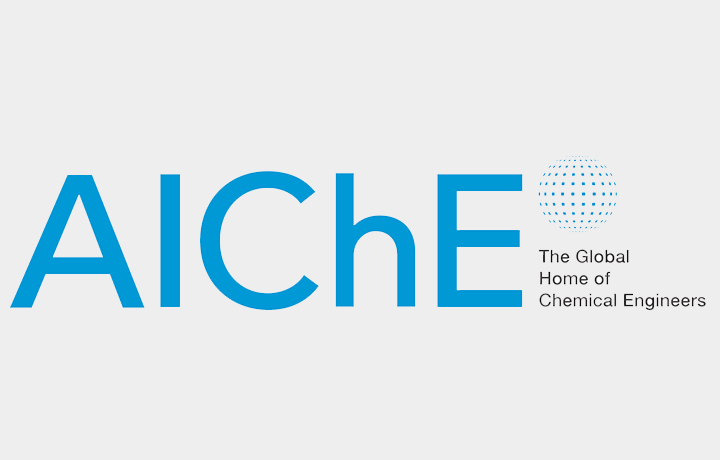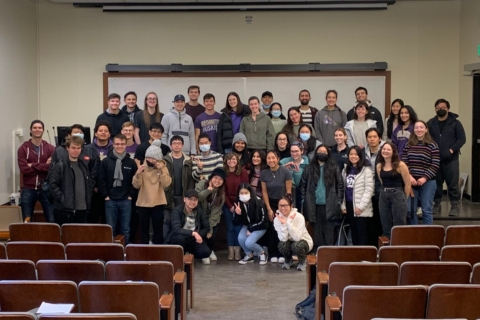Find supportive community, get hands-on experiences, change the world.
Chemical engineers are at the forefront of solutions to some of today's biggest problems, and many of the products we encounter in everyday life are made possible by processes designed by chemical engineers. Our world-renowned faculty are leaders in clean energy, health, biotechnology, data science, molecular simulation, advanced materials, and interfacial engineering. Our students have excellent undergraduate research opportunities, elective options, and connections in all of these areas.
What is Chemical Engineering?
Learn more about the unique perspective chemical engineers bring to today's biggest problems.
Careers in Chemical Engineering
A degree in chemical engineering is versatile. Explore where ChemE can take you.

Admission
Learn more about the process to join our major. UW ChemE admits transfer students and non-engineering UW students for spring quarter only.
Versatile education and careers
Chemical engineers have a strong foundation in fundamentals that allow them to pursue careers in a wide range of areas. Some of our students know they're interested in a certain area and tailor their experience to getting more focused in that area, while others cultivate multiple interests. Either way, our alumni are well prepared to solve complex problems across multiple disciplines on scales ranging from molecular processes to large-scale manufacturing.
The Seattle area is home to a growing biotechnology industry, several major technology & data science companies, and many startups. Washington State also hosts a number of opportunities in paper and pulp, chemical and oil refining, aerospace, advanced materials manufacturing, and consumer packaged items such as food!
Supportive inclusive community
UW ChemE is a close-knit department with a cohort model where students participate in the leadership of the department and have a wide range of opportunities. The relatively small size of our program means you'll also be in a department where your classmates, faculty, and advising staff will know your name, support your goals, and help you succeed. You can expect there to be 75–90 students in core courses, 15–20 in lab courses, and 15–35 in electives.
Students play an important role in the governance of our department. They serve on the Chair's Advisory Council, which works with leadership on all aspects of curriculum, community, and student needs; on the DEIA Committee; and in the leadership of student organizations that have significant roles in department functioning.
oUR COMMITMENT TO DEIA
Women in Chemical Engineering
Women in Chemical Engineering (WChE) educates, empowers, and advocates for women in chemical engineering, and their supporters.

AIChE Student Chapter
The American Institute of Chemical Engineers–UW is an undergraduate student-run organization committed to creating a sense of community and inclusion within the chemical engineering department on campus.
Hands-on experiences
ChemE provides many opportunities to apply knowledge in hands-on experiences outside of required courses and labs. Students shape their education around their interests in the following ways:
- More than 70% of our students participate in undergraduate research
- More than 20% of students study abroad, including a quarter-long program in Scotland and labs in China or Denmark
- More than 60% of our students participate in an entrepreneurial or industry-sponsored special design project
- More than 40% of our students gain industry experience through internships or coops (85% of our B.S. alumni go directly into industry)
Frequently asked questions
Some chemical engineers love chemistry and others don’t; they may even do poorly in chemistry classes. Having a basic knowledge of chemical reactions is important, but physics and math basics are more essential to chemical engineering. If you do love chemistry, there’s room to cultivate that interest, but if you don’t, you might still love chemical engineering!
Only about 15% of our students pursue graduate coursework immediately after graduating with a B.S. ChemE degree. There are many job opportunities for meaningful, interesting, and valuable work for students with a B.S. ChemE. Graduate school is a good option for students who love research and want their careers to be more research-focused.
Someone who is excited about air & space can thrive in both AA and ChemE, and both types of engineers are critical for innovation and manufacturing in the areas of air & space.
Aeronautic and astronautic engineers focus broadly on the design, development, testing, and production of aircraft and spacecraft including structures, mechanics of materials, and orbital dynamics. Chemical engineers apply their expertise to many of the critical systems and technologies that make flying possible, including advanced materials, coatings, sealants, & finishes, batteries, fuels, hydraulic systems and airflow. ChemE not only teaches fundamentals but also focuses on how to develop processes at the lab scale and scale them up. In an air & space industry increasingly dependent on computational programming and simulations to lower the cost and time of innovation, chemical engineers come equipped with data science and computational skills. Many aerospace companies specifically hire chemical engineers to work on advanced fuel control systems, which utilize the specialized knowledge of heat, mass transfer, molecular dynamics and thermodynamics that are the foundation of the ChemE curriculum.
cheme in air & spaceStudents interested in bioengineering often find chemical engineering to be a better fit for them! WHY?
Chemical engineers are able to understand the way multi-component processes interact in complex systems across length and time scales. This makes them especially well-suited for engineering applications for the human body. For example, they may model fluid flows, such as blood through the heart, to learn how stress on the vessel wall changes; design treatments that can reach a diseased site in the body; or engineer materials that can replicate spatial and temporal properties of a tissue. What differentiates ChemE's in these areas is that they must think about scale with constraints, both in terms of manufacturing and distributing medical or biological products, and in terms of economic, environmental, and societal impact.
Both ChemE and BioE are good pathways for students considering medical school or other health professional programs following their engineering degree. About 85% of chemical engineering graduates go straight to industry, with the remaining 15% going to graduate or professional school immediately following graduation.
cheme in health & medicineChemE and BSE are both good places for someone interested in process engineering and manufacturing of natural resources into fuels and other products. Both majors provide the fundamentals of transport processes and process design. BSE majors focus more on the specific application of natural products chemistry, biomaterials, and bioconversion to develop products and fuels from renewable resources. ChemE majors have a strong foundation in the principles that underlie these processes but are less specialized. Chemical engineers seek employment in a wider range of industries.
The two degrees are closely enough related that it is sometimes possible for highly motivated students to complete both degrees in a 5-year timespan. Students from both departments also frequently apply for master’s programs in chemical engineering.
ChemE in Environment, Sustainability and EnergySome students are drawn to chemical engineering because they love chemistry and want to make a difference in the world. If that describes you, you may be wondering how to choose between the two majors.
Chemical engineers have a general knowledge of chemistry, but their primary focus is process design, reaction engineering, understanding parts within systems, and change across scale, from the nano-scale up to manufacturing large quantities. Chemical engineers are typically involved in process engineering and other large-scale manufacturing in a wide range of industries including biotechnology, clean energy, consumer packaged goods, advanced materials and coatings, aerospace, and more.
Chemists have a more detailed knowledge of chemical structures, reactions, properties and the related principles and theories. They generally work with a small amount of material using laboratory instruments. Chemists work in a variety of industrial fields, including medicine, pharmaceuticals, food science, agriculture, toxicology, and consumer products. They may be involved with either basic or applied research. Many spend their days developing methods to test and characterize properties of matter and materials, while others focus on the creation of new compounds and finding ways to manipulate or use them.
Someone who is excited about computing will thrive in both disciplines. However, while CSE deals with how computing happens (and ChemE includes aspects of this), the real focus of ChemE is on using tools like computing to solve problems that have a big impact on people’s health, the climate and the environment. The scale of data available lends itself well to the systems perspective of chemical engineering and has the power to transform our future.
For example, ChemE’s use the tools of data science, machine learning and artificial intelligence to create new medicines, design and manufacturer clean energy solutions like space-age solar energy materials, and develop new ways to manufacture everyday products that use less energy, with fewer non-renewable resources. The tools of data science are embedded in a ChemE’s training; chemical engineers need to know how to manage the data and computing needs of billion-dollar semiconductor fabrication facilities with tools like Internet of Things and edge machine learning for real time process control.
ChemE in Computing, Data, and Digital TechnologiesElectrical and chemical engineering are both great disciplines for people who want to earn a degree with broad applications and opportunities spanning a wide variety of fields. Electrical engineers are specialists in understanding electricity, electronics, and electromagnetism. Their work touches all devices that produce, conduct, or use electricity. Both electrical and chemical engineers rely heavily on math and physics, and chemical engineers also integrate chemistry with design and have a deep understanding of dynamics across large spatial and temporal scales. They are specialists in process and reactor design for diverse products (from devices to drugs) and focus on reducing the cost and environmental impact of manufacturing. Both disciplines bring a strong systems perspective, integrating control theory to design and manipulate innovative devices with complex and dynamics parts.
Clean Energy
Electrical engineers and chemical engineers are both critical contributors to the emerging clean energy economy, but each plays different and complementary roles. Electrical engineers are specialists in electrical power systems — how to connect, control, and deliver electricity reliably where it is needed — whereas chemical engineers are giving electrical engineers innovative and affordable new devices for generating, storing, and using electricity.
For example, chemical engineers are involved in battery formulation, manufacturing, and recycling; in the development (and recycling) of light weight composites for wind turbines; and manufacturing of energy efficient devices (like LED lighting) that have scaled globally in just a decade. Likewise, chemical engineers are responsible for reducing the carbon footprint of fuels used in transportation and electricity generation.
Health & Medicine
Electrical engineers and chemical engineers are both critical contributors to advances in health & medicine, but each plays different and complementary roles. Electrical engineers are specialists in devices, smart integration and autonomous drug delivery systems which support personalized medicine at the doctor-patient level. Chemical engineers identify, interrogate, and modulate interactions within and across cells to engineer their function and develop cell-free devices. They also develop predictive computational models across scales (from sub-cellular to organ level), and integrate advances in materials science, bioengineering, and electrical engineering toward these goals. Chemical engineers are also deeply involved in the manufacturing scale up of medical advances of all types to ensure that a given medical advancement can be affordable, safe, consistent, and get to where it needs to go. Electrical engineers dig deeper into system identification, network theory, and control theory while chemical engineers focus more on applications.
Someone who is excited by and cares about the environment and climate will thrive in both chemical engineering and environmental engineering. While these fields share many of the same fundamental concepts, environmental engineers tend to focus more on understanding how the world and its ecosystems behave, the role that humans play in affecting those ecosystems, and the technologies that can play a role in controlling or improving the environment. Chemical engineers tend to focus more on the chemical reactions taking place in those environments and the creation of new tools that can be used to study the environment or address issues affecting it. The knowledge that chemical engineers gain about chemistry, system processes, and materials allows them to see environmental problems from both a systems-level perspective and from the perspective of individual reaction events. They often rely on environmental engineers for a broader perspective on how those reactions or processes affect other aspects of the environment.
For example, chemical engineers are involved in wastewater remediation and treatment, carbon capture, recycling, soil remediation, the removal of toxic contaminants, oil spill clean-up, desalination, and toxic gas neutralization. Chemical engineers also have the opportunity to design new processes in the most environmentally friendly way. Environmental engineers help assess current and emerging risks to the environment and human health and work closely with civil and chemical engineers to create new remediation technologies which maximize benefit and mitigate detrimental environmental impacts.
ChemE in Environment, Sustainability and EnergyChemE and MSE both are good places for someone interested in advanced materials. Historically, materials engineers were primarily interested in solid materials such as ceramics and metallurgy. Chemical engineers are experts at process engineering, historically with an emphasis on liquids and gas. Advanced materials such as polymers and soft materials are a space of significant overlap between the two and the solids/liquids dichotomy is no longer as meaningful. Both majors are broad majors with a fundamentals first approach with opportunities across a wide array of areas of impact.
Materials Science Engineers focus primarily on the materials paradigm emphasizing four distinct aspects of materials engineering: structure, properties, performance and the way that materials can be processed differently to create materials with different characteristics. MSE has more classes on materials and properties and emphasizes meeting materials constraints.
Chemical engineers focus more on how to bring individual molecules together to create ideal materials, and how to optimize the large-scale processes to create materials that meet constraints, including environmental sustainability and affordability. The curriculum emphasizes process design and economics and includes significant focus on transport processes and reactor design. These give chemical engineers knowledge about momentum and fluid mechanics, the movement of energy, heat, and mass and separations.



